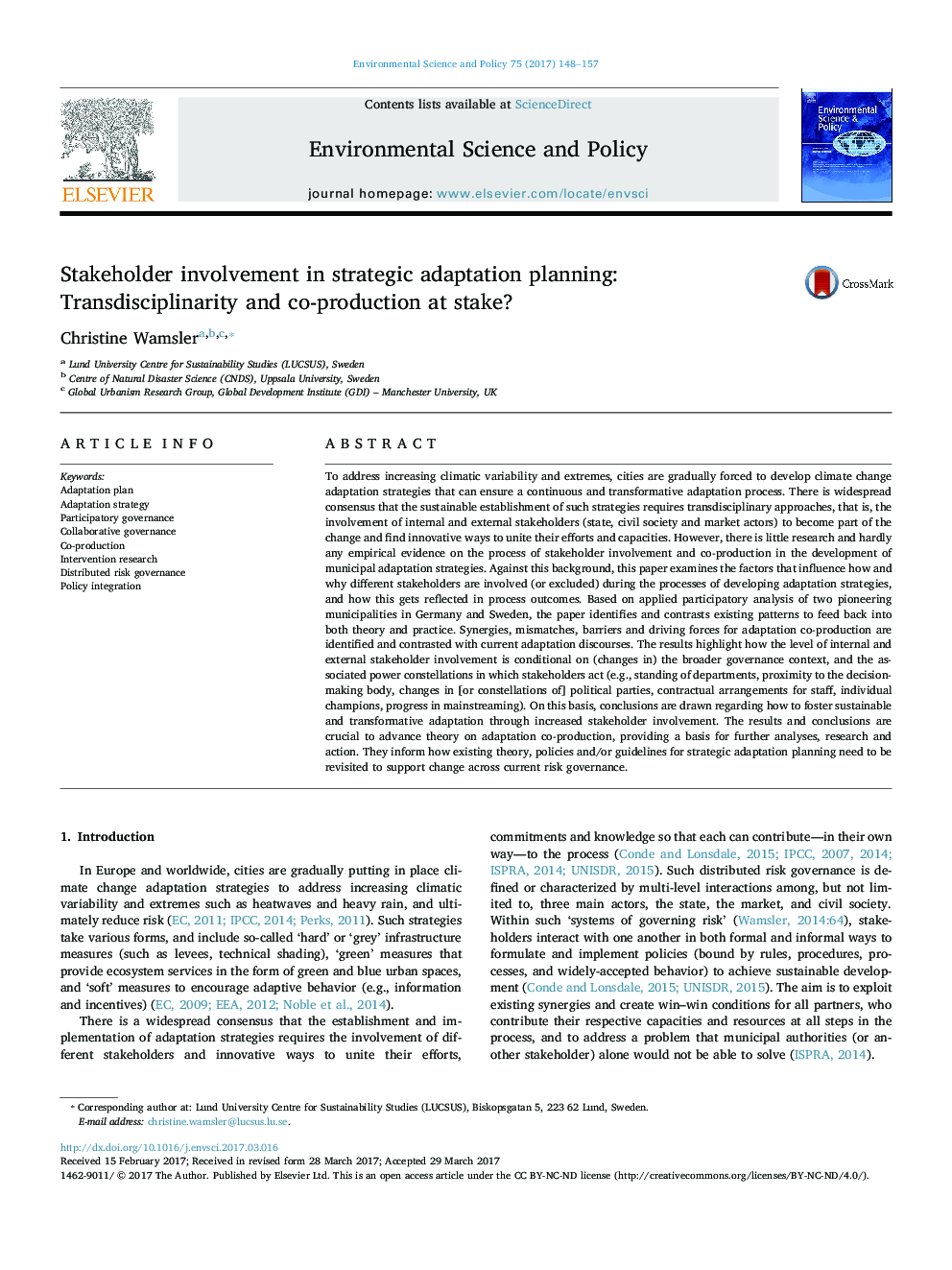| کد مقاله | کد نشریه | سال انتشار | مقاله انگلیسی | نسخه تمام متن |
|---|---|---|---|---|
| 5115802 | 1485033 | 2017 | 10 صفحه PDF | دانلود رایگان |
عنوان انگلیسی مقاله ISI
Stakeholder involvement in strategic adaptation planning: Transdisciplinarity and co-production at stake?
ترجمه فارسی عنوان
مشارکت ذینفعان در برنامه ریزی انطباق استراتژیک: میان رشته ای و تولید همکاری در خطر است؟
دانلود مقاله + سفارش ترجمه
دانلود مقاله ISI انگلیسی
رایگان برای ایرانیان
کلمات کلیدی
طرح انطباق، استراتژی انطباق، حکومت مشارکتی، حکمرانی همکاری، همکاری تولید، تحقیق مداخله، توزیع ریسک ریسک، یکپارچگی سیاست،
ترجمه چکیده
برای مقابله با شدت و شدت تغییرات اقلیمی، شهرها به تدریج مجبور به ایجاد استراتژی های انطباق تغییرات اقلیمی می شوند که می تواند فرایند انطباق مستمر و تحول را تضمین کند. اجماع گسترده ای وجود دارد که ایجاد پایدار چنین استراتژی ها مستلزم رویکردهای فراشناختی است، یعنی مشارکت ذینفعان داخلی و خارجی (دولت، جامعه مدنی و بازیگران بازار) برای تبدیل شدن به بخشی از تغییر و پیدا کردن راه های نوآورانه برای متحد کردن تلاش ها و ظرفیت های آنها . با این حال، تحقیقات کمی و تقریبا هیچ شواهد تجربی در مورد فرآیند مشارکت ذینفعان و تولید مشترک در توسعه استراتژی های انطباق شهری وجود دارد. در این زمینه، در این مقاله عوامل موثر بر چگونگی و به همین دلیل ذینفعان مختلف در فرایند توسعه استراتژی های انطباق (یا حذف شده) مورد بررسی قرار می گیرند و این که چگونه در نتایج فرایند منعکس می شود. بر اساس تجزیه و تحلیل مشارکتی اعمال شده از دو شهرداری پیشگام در آلمان و سوئد، این مقاله الگوهای موجود را برای تبیین هر دو نظریه و عمل، شناسایی و مخدوش می کند. همکاری، عدم انطباق، موانع و نیروهای راننده برای تولید همکاری تولید انطباق شناسایی شده و با گفتمان سازگاری فعلی مقایسه می شود. نتایج نشان می دهد که میزان دخالت درون و بیرونی مشارکت کنندگان در شرایط (تغییرات) در حوزه حاکمیت وسیعتر و صور فلکی قدرت مربوطه که در آن ذینفعان عمل می کنند (مانند ایستادگی از ادارات، نزدیکی به تصمیم گیری، تغییر در [یا صورت فلکی های] احزاب سیاسی، قراردادهای قراردادی برای کارکنان، قهرمانان فردی، پیشرفت در جریان اصلی). بر این اساس، نتیجه گیری در مورد چگونگی تطبیق سازگاری پایدار و تحول با افزایش مشارکت ذینفعان کشیده شده است. نتایج و نتیجه گیری ها برای پیشبرد تئوری در مورد تولید همکاری تولید انطباق حیاتی است، که پایه ای برای تحلیل ها، تحقیقات و اقدامات بیشتر فراهم می کند. آنها در مورد چگونگی تئوری، سیاست ها و / یا دستورالعمل های موجود برای برنامه ریزی اقتباس استراتژیک باید برای حمایت از تغییر در مدیریت حاکم بر ریسک های موجود تجدید نظر کنند.
موضوعات مرتبط
مهندسی و علوم پایه
مهندسی انرژی
انرژی های تجدید پذیر، توسعه پایدار و محیط زیست
چکیده انگلیسی
To address increasing climatic variability and extremes, cities are gradually forced to develop climate change adaptation strategies that can ensure a continuous and transformative adaptation process. There is widespread consensus that the sustainable establishment of such strategies requires transdisciplinary approaches, that is, the involvement of internal and external stakeholders (state, civil society and market actors) to become part of the change and find innovative ways to unite their efforts and capacities. However, there is little research and hardly any empirical evidence on the process of stakeholder involvement and co-production in the development of municipal adaptation strategies. Against this background, this paper examines the factors that influence how and why different stakeholders are involved (or excluded) during the processes of developing adaptation strategies, and how this gets reflected in process outcomes. Based on applied participatory analysis of two pioneering municipalities in Germany and Sweden, the paper identifies and contrasts existing patterns to feed back into both theory and practice. Synergies, mismatches, barriers and driving forces for adaptation co-production are identified and contrasted with current adaptation discourses. The results highlight how the level of internal and external stakeholder involvement is conditional on (changes in) the broader governance context, and the associated power constellations in which stakeholders act (e.g., standing of departments, proximity to the decision-making body, changes in [or constellations of] political parties, contractual arrangements for staff, individual champions, progress in mainstreaming). On this basis, conclusions are drawn regarding how to foster sustainable and transformative adaptation through increased stakeholder involvement. The results and conclusions are crucial to advance theory on adaptation co-production, providing a basis for further analyses, research and action. They inform how existing theory, policies and/or guidelines for strategic adaptation planning need to be revisited to support change across current risk governance.
ناشر
Database: Elsevier - ScienceDirect (ساینس دایرکت)
Journal: Environmental Science & Policy - Volume 75, September 2017, Pages 148-157
Journal: Environmental Science & Policy - Volume 75, September 2017, Pages 148-157
نویسندگان
Christine Wamsler,
